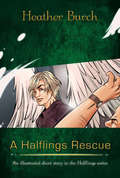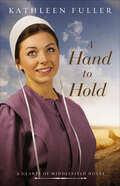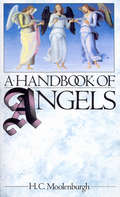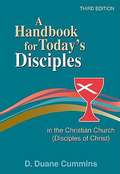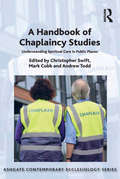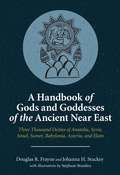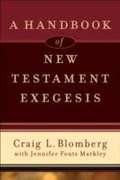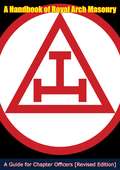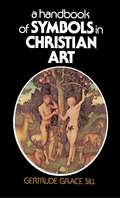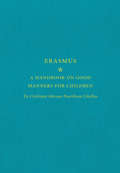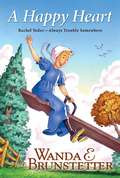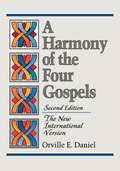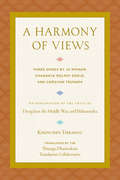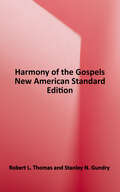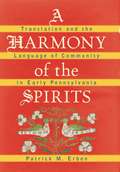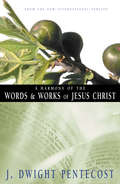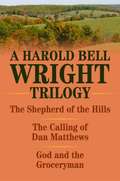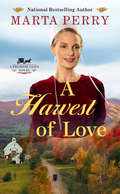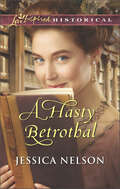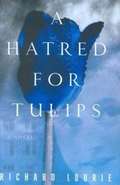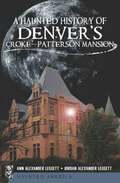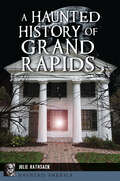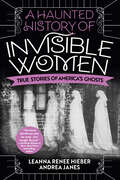- Table View
- List View
A Halflings Rescue
by Heather BurchIn this free illustrated short story from the popular Halflings series by Heather Burch, Nikki and the Halflings team intercept important information regarding the kidnapping of Hollywood's hottest teen celebrity, Mandy Mosen. Will they be able come to the young starlet's aide in time, or is Mandy's fifteen minutes of fame about to end? Includes a bonus first chapter from Guardian, the next full novel in the Halflings series!
A Hand to Hold: A Man Of His Word, An Honest Love, A Hand To Hold (The Hearts of Middlefield Novels #3)
by Kathleen FullerRuth Byler has never failed at anything in her life, but Zach Bender is going to test the limits of her heart.A student at heart, Ruth is finally a teacher at the Amish schoolhouse. But after her first day, she wonders if she&’s made a mistake. The students want nothing to do with learning. Deflated, she makes a promise to herself to not give up—not yet.When Zach comes to fix a repair at the schoolhouse, he notices the young Amish teacher and the disorderly students. After seeing enough, he storms into the classroom and demands the students show Ruth respect. Satisfied he's done a good deed, he waits around so Ruth can thank him. Instead she's furious he interfered. Zach leaves, thinking she's still the snobby, bookworm he knew from school. He doesn&’t have much use for learning. And now he has little use for Ruth.There&’s more to Zach&’s story, and when Ruth finds out the truth to why he hated school, the consequences leave them seeing each other in a different light. Ruth can help Zach if he&’ll let her. But to do so, he&’ll need to offer her his hand.
A Handbook Of Angels
by H C MoolenburghIn 1981 a sermon was given in Leiden in which the minister called angels, 'a forgotten group'. This book is an attempt to recall a forgotten group into the memory of everyone.We read so much these days about matters concerning the underworld, that we are inclined to forget that an enormous 'upper world' stretches out above us. A world which is also extremely active, and one which is increasingly beginning to intrude. In A Handbook of Angels the author recounts his survey of four hundred people and the spectacular results, which include reportings of real-life sightings of angels.It becomes apparent that, though we may have forgotten about angels, they have not forgotten about us. They are returning to human consciousness on a gigantic scale.
A Handbook for Today’s Disciples: In the Christian Church (Disciples of Christ)
by D. Duane CumminsThis new revised edition of a Disciples classic is an overview of the Christian Church (Disciples of Christ). In offering an overview of the church, this handbook provides concise information on Disciples heritage, thought, worship, mission, and structure, making it a valuable resource for both church members and members-to-be, and for those who simply want to know more about the church. The author illustrates his summaries of Disciples traditions with excerpts from Disciples documents and scripture, bringing a major American religious movement vividly to life.
A Handbook of Chaplaincy Studies: Understanding Spiritual Care in Public Places (Routledge Contemporary Ecclesiology)
by Andrew Todd Mark Cobb Christopher SwiftA Handbook of Chaplaincy Studies explores fundamental issues and critical questions in chaplaincy, spanning key areas of health care, the prison service, education and military chaplaincy. Leading authors and practitioners in the field present critical insight into the challenges and opportunities facing those providing professional spiritual care. From young men and women in the military and in custody, to the bedside of those experiencing life’s greatest traumas, this critical examination of the role played by the chaplain offers a fresh and informed understanding about faith and diversity in an increasingly secular society. An invaluable compendium of case-studies, academic reflection and critical enquiry, this handbook offers a fresh understanding of traditional, contemporary and innovative forms of spiritual practice as they are witnessed in the public sphere. Providing a wide-ranging appraisal of chaplaincy in an era of religious complexity and emergent spiritualities, this pioneering book is a major contribution to a relatively underdeveloped field and sets out how the phenomenon of chaplaincy can be better understood and its practice more robust and informed.
A Handbook of Gods and Goddesses of the Ancient Near East: Three Thousand Deities of Anatolia, Syria, Israel, Sumer, Babylonia, Assyria, and Elam
by Douglas R. Frayne Johanna H. StuckeyFrom the tragic young Adonis to Zašhapuna, first among goddesses, this handbook provides the most complete information available on deities from the cultures and religions of the ancient Near East, including Anatolia, Syria, Israel, Sumer, Babylonia, Assyria, and Elam. The result of nearly fifteen years of research, this handbook is more expansive and covers a wider range of sources and civilizations than any previous reference works on the topic. Arranged alphabetically, the entries range from multiple pages of information to a single line—sometimes all that we know about a given deity. Where possible, each record discusses the deity’s symbolism and imagery, connecting it to the myths, rituals, and festivals described in ancient sources. Many of the entries are accompanied by illustrations that aid in understanding the iconography, and they all include references to texts in which the god or goddess is mentioned.Appropriate for both trained scholars and nonacademic readers, this book collects centuries of Near Eastern mythology into one volume. It will be an especially valuable resource for anyone interested in Assyriology, ancient religion, and the ancient Near East.
A Handbook of Gods and Goddesses of the Ancient Near East: Three Thousand Deities of Anatolia, Syria, Israel, Sumer, Babylonia, Assyria, and Elam
by Douglas R. Frayne Johanna H. StuckeyFrom the tragic young Adonis to Zašhapuna, first among goddesses, this handbook provides the most complete information available on deities from the cultures and religions of the ancient Near East, including Anatolia, Syria, Israel, Sumer, Babylonia, Assyria, and Elam. The result of nearly fifteen years of research, this handbook is more expansive and covers a wider range of sources and civilizations than any previous reference works on the topic. Arranged alphabetically, the entries range from multiple pages of information to a single line—sometimes all that we know about a given deity. Where possible, each record discusses the deity’s symbolism and imagery, connecting it to the myths, rituals, and festivals described in ancient sources. Many of the entries are accompanied by illustrations that aid in understanding the iconography, and they all include references to texts in which the god or goddess is mentioned.Appropriate for both trained scholars and nonacademic readers, this book collects centuries of Near Eastern mythology into one volume. It will be an especially valuable resource for anyone interested in Assyriology, ancient religion, and the ancient Near East.
A Handbook of New Testament Exegesis (New Testament Studies)
by Craig L. Blomberg Jennifer Foutz MarkleyThis handbook provides a one-stop-shopping guide to the New Testament exegetical method. Brief and approachable, it offers both a broad overview of the exegetical process and a step by step approach to studying the New Testament in depth, helping students and pastors understand the text and appropriate it responsibly. The book is chockfull of illustrations of New Testament texts where the method under discussion truly makes a difference."A wonderfully clear and accessible handbook for New Testament exegesis. Exegetically rigorous, theologically informed, and practically useful."Thomas R. Schreiner, Southern Baptist Theological Seminary
A Handbook of Royal Arch Masonry: A Guide for Chapter Officers [Revised Edition]
by Royal Arch MasonsThe York Rite (sometimes referred to as the American Rite) is one of several Rites of Freemasonry. A Rite is a series of progressive degrees that are conferred by various Masonic organizations or bodies, each of which operates under the control of its own central authority. The York Rite specifically is a collection of separate Masonic Bodies and associated Degrees that would otherwise operate independently. The three primary bodies in the York Rite are the Chapter of Royal Arch Masons, Council of Royal & Select Masters or Council of Cryptic Masons, and the Commandery of Knights Templar, each of which are governed independently, but are all considered to be a part of the York Rite.Royal Arch Masonry is the first part of the York Rite system of the Masonic degrees. Royal Arch Masons meet as a Chapter, and the Royal Arch Chapter confers four degrees: Mark Master Mason, Past Master, Most Excellent Master, and Royal Arch Mason.This 1962 revised edition of A Handbook of Royal Arch Masonry: A Guide for Chapter Officers includes a detailed section on the ritual prescribed by The Grand Chapter of Royal Arch Masons of the State of Wisconsin, and revised by their Ritual Committees (1959-1962), for Constituent Chapters working towards one of the four degrees.
A Handbook of Symbols in Christian Art
by Gertrude Grace SillExplore one of the richest and most rewarding aspects of Western art with this comprehensive easy-to-use, portable guide to Christian symbols. Organized like a primer, with hundreds of entries in 50 categories -- from A for Angels to Z for Zodiac -- this handy pocket reference enables you to recognize at a glance the identity and meaning of all the elements in any Christian work of art. 162 paintings from every century illustrate the enduring themes of our biblical heritage. A short introductory essay explains how to use the handbook and the functions of symbols in art.
A Handbook on Good Manners for Children: De Civilitate Morum Puerilium Libellus
by ErasmusWhen did you last tell your children to put their hand over their mouth when they yawn? When did you last suggest that when they are introduced to someone they should shake hands firmly and look them in the eye? Do you suggest that they should wait until everyone is served before they eat rather than hoover up the best bit for themselves? Do you demand that your young daughter dress decorously lest she elicit outraged looks? Do you think that the children of today have disgraceful manners? Unlike, of course, when you were young ... Well, that's certainly what Erasmus of Rotterdam thought in 1530 when he published De Civilitate Morum Puerilium: A Handbook on Good Manners for Children. He felt that learning good manners was crucial to a child's upbringing, and that the uncouth and ill-disciplined behaviour around him demanded a new kind of book. After all, as William of Wykeham memorably said in the 1350s, 'Manners maketh man'. A Handbook on Good Manners for Children is considered to be the first treatise in Western Europe on the moral and practical education of children. It was a massive bestseller - indeed the biggest-selling book of the sixteenth century - going into 130 editions over 300 years and being translated into 22 languages within ten years of its publication. In it, Erasmus concerns himself with matters such as how to dress, how to behave at table, how to converse with one's elders and contemporaries, how to address the opposite sex and much else. For example: Table Manners 'It's just as rude to lick greasy fingers as it is to wipe them on your clothing, Use a cloth or napkin instead.''Some people, no sooner than they've sat down, immediately stick their hands into the dishes of food. This is the manner of wolves.' 'Making a raucous noise or shrieking intentionally when you sneeze, or showing off by carrying on sneezing on purpose, is very ill-mannered.''To fidget around in your seat, and to settle first on one buttock and then the next, gives the impression that you are repeatedly farting, or trying to fart.' The advice is as relevant today as it was 500 years ago.
A Handbook to Old Testament Exegesis
by William P. BrownDesigned for both Hebrew and non-Hebrew students, A Handbook to Old Testament Exegesis offers a fresh, hands-on introduction to exegesis of the Old Testament. William P. Brown begins not with the biblical text itself but with the reader, helping students to identify their own interpretive lenses before engaging the biblical text. Brown guides the student through a wide variety of interpretive approaches, including modern methodologies--feminist, womanist, Latino/a, queer, postcolonial, disability, and ecological approaches--alongside more traditional methods. This allows students to critically reflect on themselves as bona fide interpreters. While covering a wide range of biblical passages, Brown also highlights two common biblical texts throughout the work to help show how each interpretive approach highlights different dimensions of the same texts. Students will appreciate the value of an empathetic inquiry of Scripture that is both inclusive of others and textually in-depth.
A Happy Heart (Rachel Yoder, Always Trouble Somewhere Series Book #5)
by Wanda E. BrunstetterEleven-year-old Rachel experiences a case of the grumpies when things don't go her way, and she eventually learns an important lesson about happiness. Parents and children alike will fall in love with this delightful Amish girl, who seems to find trouble following close on her barefooted heels at every turn.
A Harmony Of The Four Gospels: The New International Version
by Orville E. DanielOne of the easiest-to-use parallel text harmonies of the Gospels looks more inviting. Improved type design aids readability of the four parallel columns. Boldface type sets out a unified narrative.
A Harmony of Views: Three Songs by Ju Mipham, Changkya Rolpay Dorje, and Chögyam Trungpa
by Khenchen ThranguThree songs by recognized masters of different Tibetan Buddhist traditions illustrate what their views have in common--with commentary by Thrangu Rinpoche and songs by Ju Mipham, Changkya Rolpay Dorje, and Chögyam Trungpa.Do different Tibetan Buddhist traditions share an essential, common view?The great Geluk scholar Changkya Rolpay Dorje (1717-1786) wrote a song describing the view of the Middle Way, comparing it to a mother. Later, the nonsectarian polymath Ju Mipham Rinpoche (1846-1912) and the influential Kagyu master Chögyam Trungpa Rinpoche (1939-1987) wrote songs modeled upon it that describe the views of dzogchen and mahamudra, one comparing dzogchen to a jewel and the other comparing mahamudra to a lover. Even though the imagery and the specific points each author makes are different, the songs share many characteristics in structure and content. Read together, the three songs show how the essential points of these three practices are the same and reveal how Buddhism's various traditions--including the pinnacles of the Middle Way, dzogchen, and mahamudra--are harmonious. The three songs are presented with a commentary by Khenchen Thrangu Rinpoche, who explains how studying the profound view helps develop the certainty that is necessary to bring meditation practice to fruition. He shows how songs such as these can serve as antidotes to discouragement and provide help to people who have had strong meditation experiences but find themselves unable to sustain a high level of practice. Thrangu Rinpoche explains that, in comparison to oral instructions and treatises, songs of this kind are of special benefit because of their engaging eloquence. The songs are not long, and they are a delight to read, reread, and memorize. By clarifying the view again and again in this way, they offer continual inspiration to practitioners.
A Harmony of the Gospels (G - Reference, Information and Interdisciplinary Subjects)
by Stanley N. Gundry Robert L. ThomasThis resource encourages a deeper understanding of the life, death, and resurrection of Jesus Christ by harmonizing the accounts of Matthew, Mark, Luke, and John so as to assemble as many details as possible into a chronologically meaningful sequence.
A Harmony of the Spirits
by Patrick M. ErbenIn early Pennsylvania, translation served as a utopian tool creating harmony across linguistic, religious, and ethnic differences. Patrick Erben challenges the long-standing historical myth--first promulgated by Benjamin Franklin--that language diversity posed a threat to communal coherence. He deftly traces the pansophist and Neoplatonist philosophies of European reformers that informed the radical English and German Protestants who founded the "holy experiment." Their belief in hidden yet persistent links between human language and the word of God impelled their vision of a common spiritual idiom. Translation became the search for underlying correspondences between diverse human expressions of the divine and served as a model for reconciliation and inclusiveness.Drawing on German and English archival sources, Erben examines iconic translations that engendered community in colonial Pennsylvania, including William Penn's translingual promotional literature, Francis Daniel Pastorius's multilingual poetics, Ephrata's "angelic" singing and transcendent calligraphy, the Moravians' polyglot missions, and the common language of suffering for peace among Quakers, Pietists, and Mennonites. By revealing a mystical quest for unity, Erben presents a compelling counternarrative to monolingualism and Enlightenment empiricism in eighteenth-century America.
A Harmony of the Words and Works of Jesus Christ
by J. Dwight PentecostThe goal of this volume is to help you know Jesus better by getting a clearer picture of him through the four Gospels—the books that directly depict his life, his ministry, and his heart. Scripture is set with Scripture in chronological order, revealing the harmony of the biblical accounts and bringing the person of Jesus into greater focus. Featuring harmonized Bible texts from the New International Version, this book first introduces and then follows the identical outline of the life of Christ used in The Words and Works of Jesus Christ by J. Dwight Pentecost. This simple, logical presentation of the complete parallel text with the outline greatly simplifies your study of Christ's life. A Harmony of the Words and Works of Jesus Christ is ideal for use with The Words and Works of Jesus Christ and makes an outstanding parallel Scripture text for any study of the Gospels or the life of Christ.
A Harold Bell Wright Trilogy: Shepherd of the Hills, The Calling of Dan Matthews, and God and the Groceryman
by Harold Bell WrightThe Shepherd of the Hills: This is Harold Bell Wright's most famous work. The shepherd, an elderly, mysterious, learned man, escapes the buzzing restlessness of the city to live in the Ozarks. This shepherd is based on Wright himself, who moved to the Ozarks and established a ministry. The Calling of Dan Matthews: In this sequel, Dan Matthews, becomes the new minister of the Midwestern town of Corinth. God and the Groceryman: This last book is a plea for God's presence in all aspects of life.
A Harvest of Love (The Promise Glen Series #3)
by Marta PerryA determined widow and a single father learn that love is about taking chances and turning over new leaves in the quaint Amish community of Promise Glen, from national bestselling author Marta Perry.When widowed shop owner Dinah Hershberger is unceremoniously charged with safely escorting an infant to his uncle, she finds herself torn. Jacob Miller is everything Dinah could want in a partner--he's kind, handsome, strong--and nothing she can ever have. As much as she yearns to help the new family adjust, each minute Dinah spends with Jacob and the baby leaves her heart more vulnerable and her head more certain that the secret she hides makes a future with the Miller men impossible. Jacob has long admired Dinah for her strength and independence, but it's her generosity of spirit that tempts him like never before. With Dinah at his side, Jacob opens himself up to the daunting new world of fatherhood, but how can he pursue his feelings for her when his life is in such disarray? After the disappointments of her first marriage, she deserves better than what Jacob can offer. But love has a surprise in store for these two troubled hearts, and happiness is within reach if only they can grasp it, making Promise Glen their own promised land.
A Hasty Betrothal
by Jessica NelsonA Practical Proposal Though Lady Elizabeth Wayland would rather spend her days with her beloved books than an uncaring spouse, scandal forces her to find a match posthaste. To escape the scoundrel who almost ruined her, Elizabeth accepts an unconventional proposal from a childhood friend. But when she finds herself falling for her husband-to-be, will she be able to convince him to return her love? Widowed cotton mill owner Miles Hawthorne vowed to never marry again-until Elizabeth's reputation is on the line. Their betrothal begins as a simple favor. As he spends more time with his fiancée, though, Miles finds that there's more to her than he ever saw before. And Elizabeth just might be the only woman who can slip into his heart.
A Hatred For Tulips
by Richard LourieJoop, is the narrator of this brief and bitter tale, whose secret is like no other. He has kept that secret for more than sixty years.
A Haunted History of Denver's Croke-Patterson Mansion (Haunted America)
by Jordan Alexander Leggett Ann Alexander LeggettStep into this nineteenth-century Colorado landmark and discover its paranormal history . . . Photos included! An ominous air hangs about Capitol Hill&’s historic Croke-Patterson Mansion. Rumors of spirits and strange events have cast a shadow across its elegant Gilded Age facade. The lonely halls are haunted with stories of a doctor&’s wife who committed suicide and the ghostly figure of a young woman who appears to visitors. Tenants of the building have also claimed to hear the cries of children, and dark specters in the basement prevent even the hardiest souls from staying for too long. In this fascinating book, authors Ann Alexander Leggett and Jordan Alexander Leggett explore the mysteries that have plagued this Denver mansion for over a century.
A Haunted History of Grand Rapids (Haunted America)
by Julie RathsackGrand Rapids history is crowded with departed souls who refuse to rest in peace. The twisted spirit of Lolita, a mother who committed unspeakable acts upon her children, stalks the block where she grew up. In life, Frank Hibben Stout's obsession with his "sister" led to a tragic end for both. In death, his blood-dripping apparition is seen where a local restaurant now stands. The protective spirit of Edythe first appeared after a fateful Ouija board game at a local church, and the Children's Museum is haunted by the friendly spirit of a boy seen by the young and old alike. Come walk with the dead as author Julie Rathsack weaves together the threads of the forgotten past with the spirits who have remained behind.
A Haunted History of Invisible Women: True Stories of America's Ghosts
by Leanna Renee Hieber Andrea Janes"Deliciously eerie.&” —Leslie Rule, Bestselling AuthorFrom the notorious Lizzie Borden to the innumerable, haunted rooms of Sarah Winchester's mysterious mansion this offbeat, insightful, first-ever book of its kind from the brilliant guides behind &“Boroughs of the Dead,&” featured on NPR.org, The New York Times, and Jezebel, explores the history behind America&’s female ghosts, the stereotypes, myths, and paranormal tales that swirl around them, what their stories reveal about us—and why they haunt us . . . Sorrowful widows, vengeful jezebels, innocent maidens, wronged lovers, former slaves, even the occasional axe-murderess—America&’s female ghosts differ widely in background, class, and circumstance. Yet one thing unites them: their ability to instill fascination and fear, long after their deaths. Here are the full stories behind some of the best-known among them, as well as the lesser-known—though no less powerful . . . Tales whispered in darkness often divulge more about the teller than the subject. America&’s most famous female ghosts, from &‘Mrs. Spencer&’ who haunted Joan Rivers&’ New York apartment to Bridget Bishop, the first person executed during the Salem witchcraft trials, mirror each era&’s fears and prejudices. Yet through urban legends and campfire stories, even ghosts like the nameless hard-working women lost in the infamous Triangle Shirtwaist Factory fire —achieve a measure of power and agency in death, in ways unavailable to them as living women. Riveting for skeptics and believers alike, with humor, curiosity, and expertise, A Haunted History of Invisible Women offers a unique lens on the significant role these ghostly legends play both within the spook-seeking corners of our minds and in the consciousness of a nation. Afterword by Bram Stoker Award-winning author Linda D. Addison&“An absolute must-buy for the spooky people of the world . . . utterly brilliant.&” —Mallory O'Meara, bestselling author of The Lady from the Black Lagoon and Girly Drinks&“If this book doesn&’t leave with you a sense of wonder and a healthy dose of goosebumps, check your pulse—you may already be among the spirits.&” —Marc Hartzman, author of Chasing Ghosts: A Tour of Our Fascination with Spirits and the Supernatural
